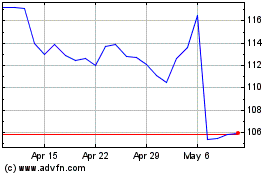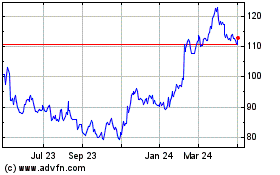By Dan Weil
One may be the loneliest number, as the song says. But there is
nothing wrong with owning one share of stock, financial advisers
say.
In fact, buying one share of stock has recently become easier
than ever.
True, buying a single share might seem, well, kind of pointless.
But for smaller investors, it can be a powerful psychological tool,
a way to experiment with investing in individual companies and
getting a feel for their day-to-day movements before taking a
bigger plunge. It can also be a relatively safe and easy way to
diversify a small portfolio -- or even introduce a young person to
the world of investing.
That hasn't always been the case. In the past, commissions could
add a meaningful percentage to the price of buying a single share
or subtract a decent percentage from the income gained by selling
one. But going the solo-share route has become a strategically
viable option in the past year, as most online brokerages have cut
their trading commission to zero. Some brokerages even offer free
trading for fractional shares -- just a piece of one share -- of
companies and exchange-traded funds.
"Buying or selling a single share makes sense, because you're
not paying, " says Nancy Tengler, chief investment officer at
Laffer Tengler Investments in Phoenix.
The big numbers
In most cases, of course, buying one share doesn't get you much.
But some popular stocks are so expensive that buying just one stock
can offer a substantive investment. The list includes Amazon.com at
$3,125 a share and Google parent Alphabet at $1,458.42 for the
Class C shares (GOOG).
Largely, though, you're going to be buying single shares of
less-pricey stocks, which allows you to include more companies in
your holdings. "You can more easily get diversified exposure," says
Christine Benz, director of personal finance for Morningstar, an
investment-research firm in Chicago.
You can even set up your own mini-index fund by purchasing a
range of single shares. For instance, investors can buy shares of
many companies from a small index, such as the Dow Jones Industrial
Average, which comprises 30 blue-chip stocks, or the S&P 500
Dividend Aristocrats Index, which generally includes 40 to 50
stocks in the S&P 500 index that have increased dividends for
at least 25 straight years, Ms. Tengler says. Dividends from even
single shares of such stocks, when combined, can provide meaningful
payouts for small investors.
Or you can cherry-pick stocks from larger indexes, such as the
S&P 500 or the Nasdaq-100 Index, which is heavily weighted
toward big technology companies. "Index providers have done the
research for you," Ms. Tengler says. "If you're a tech geek, or if
you're into health care, you can create your own sector fund. You
have to buy what you understand."
Buying a single share can also bring psychological benefits. If
you want a stock but fear the market will turn against you, picking
up one share gives you a safe way to get the satisfaction of
following through on your belief.
What's more, going for just one share can help you ease into the
idea of making larger stock investments. "It's like getting into
the pool slowly, " Ms. Tengler says.
Once a stock is in your portfolio, you'll likely follow it
closely, learning more about the company and perhaps buying more
later on. "The transaction makes you more aware of the stock than
if you didn't buy," says Ken Mahoney, CEO of Mahoney Asset
Management in Chestnut Ridge, N.Y. "It's like a placeholder."
A gift idea
Another benefit of buying a single share is that it gives you
access to the company's annual meeting, he says. Many shareholders
love going to Berkshire Hathaway's meeting in Omaha, Neb., to see
CEO Warren Buffett presiding. (This year's meeting was online.)
If you are going to buy any single share, Berkshire would be the
one, as you're getting "a basket of businesses run by the best
capital allocator of our lifetime," says Morningstar's Ms. Benz,
who generally recommends funds over individual stocks.
Finally, single shares can be a good gift for friends and family
-- sometimes as a lark (a share of Walt Disney to a Disney fan, for
example) or a way for a parent or grandparent to help young people
learn about companies and financial markets. "It's a teachable
moment for how stocks and investments work," says Tom Fredrickson,
a New York financial planner. "I'm thinking I should do that with
my [20-year-old] son."
Jack Ablin, chief investment officer at Cresset Capital in
Chicago, says he was given a single share of Comsat -- a
telecommunications company -- as a youngster. "it helped spark my
interest in stocks," he says.
Mr. Weil is a writer in West Palm Beach, Fla. He can be reached
at reports@wsj.com.
(END) Dow Jones Newswires
October 04, 2020 11:52 ET (15:52 GMT)
Copyright (c) 2020 Dow Jones & Company, Inc.
Walt Disney (NYSE:DIS)
Historical Stock Chart
From Mar 2024 to Apr 2024

Walt Disney (NYSE:DIS)
Historical Stock Chart
From Apr 2023 to Apr 2024
